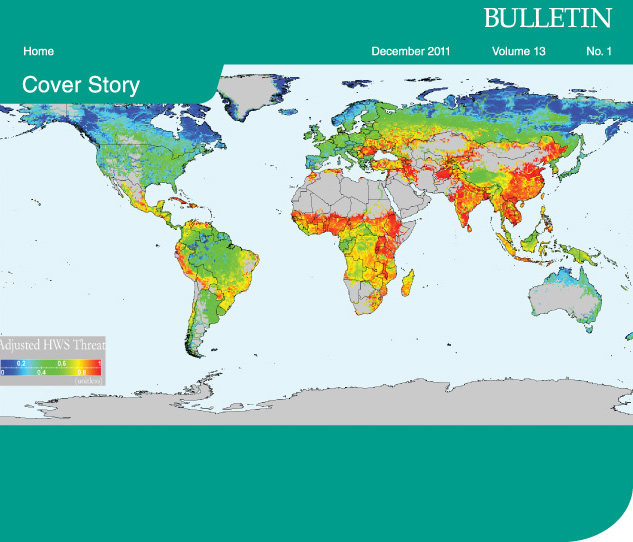
|
|
The first global survey of the state of freshwater habitats and sources, 'Rivers in Crisis', co-authored by Professor David Dudgeon and 10 other scientists from around the world, has found that rivers serving 80 per cent of the world's population are significantly degraded and biodiversity in 65 per cent of freshwater habitats is at risk. The researchers have produced maps showing the worst-affected areas are in India, China and sub-Saharan Africa for both human water security and biodiversity. Wealthier regions such as Europe and North America can afford to engineer water security with dams and other measures, but this does not remove the threat to biodiversity. The threat comes from human activities and the extraction of increasing quantities of water. People are disturbing the watershed by converting it to cropland or covering it with concrete. They are disturbing water flows by building dams and levees and disconnecting rivers from the wetlands. They are polluting fresh waters with waste livestock farms, industry and other sources. And they are overfishing, which is depleting fish populations. "The first message from our research is the sheer magnitude of the threat to both humans and biodiversity. A few specific things may be unique, like dams which are good for humans and bad for biodiversity, but most of these things affect them both," says Professor Dudgeon, who is Chair Professor of Ecology and Biodiversity. "The developed world has engineered its way out of this problem for human water security by damming and treating the water, but no comparable investment has been made for biodiversity protection." "It's pretty silly to invest money in solving a problem that you could have avoided creating in the first place." Better land management, irrigation and conservation efforts could help but unfortunately, water sources are under urgent, growing pressure as human populations increase and people strive for a better quality of life, which usually means using more water for cropland, sanitation and other demands. |
Dams are particularly damaging to biodiversity because they change water flows and patterns and affect freshwater habitats. This has a knock-on effect on fisheries because it disrupts the migration patterns of river fish. Professor Dudgeon cites the looming threats to the Mekong River, which in fisheries terms is the world's most productive river. There are plans to build 11 new dams along its course, which will impact on fishermen and farmers, as well as biodiversity. "For most of these projects, the benefits are felt quite far away in cities and the people on the ground are impacted without consequential benefits," he says. |
|
Professor Dudgeon says governments have moral and practical imperatives for taking urgent action to reduce the threats to the world's fresh water habitats, and implementing integrated water resource management plan that address both biodiversity and human water security. "On the one hand is the common evolutionary threat and the right to existence. We share the Earth with other species and we are the only ones who can determine their fate, so we have a moral responsibility to do something. I would like to see governments act on this but I am perfectly certain it would hold no water." "But there are other reasons. If you look at our analysis, it tells you that what is bad for biodiversity is bad for humans: we can't use the water without substantial investment. "A third reason is that functioning ecosystems actually do good things for us. A functional system has the ability to purify itself so the water requires virtually no treatment. And if you think of wetlands, the vegetation absorbs water and helps to control floods. There is also the benefit from freshwater fisheries, especially in Africa and Southeast Asia." To add further weight to the evidence, Professor Dudgeon and his colleagues, who had their report published in Nature last year, will try next to measure the impacts of the threats. But he warns governments should not wait to act. Discussions to protect the baiji (Yangtze River dolphin) in China, for instance, dragged on so long that the animal became extinct. Further information is available at http://www.riverthreat.net/ |
| Back | Next | |
